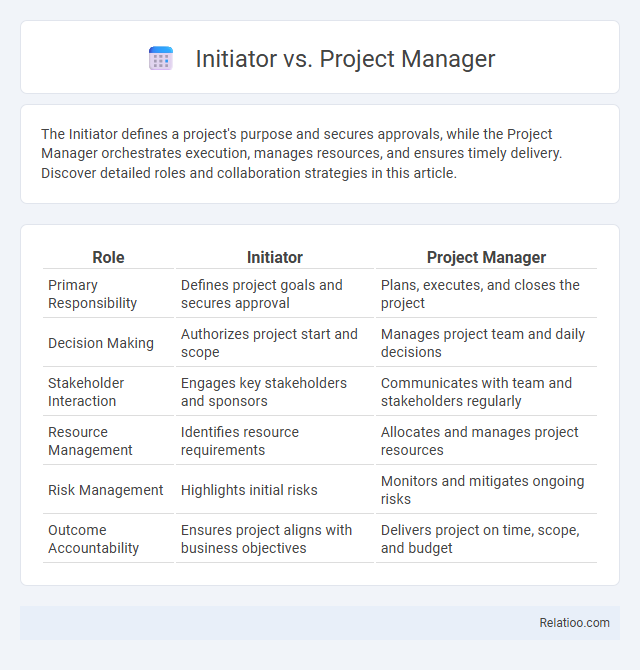The Initiator defines a project's purpose and secures approvals, while the Project Manager orchestrates execution, manages resources, and ensures timely delivery. Discover detailed roles and collaboration strategies in this article.
Table of Comparison
| Role | Initiator | Project Manager |
|---|---|---|
| Primary Responsibility | Defines project goals and secures approval | Plans, executes, and closes the project |
| Decision Making | Authorizes project start and scope | Manages project team and daily decisions |
| Stakeholder Interaction | Engages key stakeholders and sponsors | Communicates with team and stakeholders regularly |
| Resource Management | Identifies resource requirements | Allocates and manages project resources |
| Risk Management | Highlights initial risks | Monitors and mitigates ongoing risks |
| Outcome Accountability | Ensures project aligns with business objectives | Delivers project on time, scope, and budget |
Understanding the Role of an Initiator
An Initiator is the individual or entity responsible for defining the project's purpose, objectives, and initial scope before formal planning begins, distinguishing their role from that of a Project Manager who oversees execution and team coordination. You rely on the Initiator's clear vision and strategic intent to ensure project alignment with organizational goals, enabling effective resource allocation and stakeholder engagement. Understanding the Initiator's role clarifies accountability for project inception, scope definition, and securing initial buy-in, which are critical for project success.
Defining the Project Manager’s Responsibilities
The Project Manager is responsible for planning, executing, and closing projects, ensuring all deliverables meet quality standards and deadlines while managing resources and risks effectively. Unlike the Initiator, who primarily defines the project's purpose and secures initial approval, the Project Manager operationalizes the vision by coordinating teams and communicating progress to stakeholders. Your focus as a Project Manager should be on aligning project objectives with organizational goals, maintaining clear timelines, and resolving any issues that threaten project success.
Core Skills: Initiator vs. Project Manager
The Initiator excels in vision articulation, opportunity identification, and stakeholder engagement, emphasizing strategic foresight and innovation to launch projects successfully. The Project Manager specializes in detailed planning, resource allocation, risk management, and execution control, ensuring project objectives are met on time and within budget. Core skills contrast as the Initiator drives idea generation and alignment, while the Project Manager focuses on operational delivery and team coordination.
Key Objectives of Initiators in Projects
Initiators in projects primarily focus on defining the project's purpose, securing initial approvals, and aligning objectives with organizational strategy to ensure a strong foundation. Your role as an initiator involves identifying key stakeholders and establishing clear success criteria to guide the project's direction from inception. Unlike project managers who concentrate on execution and control, initiators emphasize vision clarity and feasibility assessment to set the stage for successful project outcomes.
Stages of Involvement: When Each Role Shines
The Initiator plays a critical role during the project's inception, defining the vision and securing initial approvals to set the foundation. The Project Manager takes charge throughout the execution and monitoring phases, ensuring timely delivery, resource allocation, and risk management. Your collaboration with the Sponsor becomes essential during the closing phase, where final approvals and project evaluation secure success and stakeholder satisfaction.
Decision-Making Authority: Initiator and Project Manager
The Initiator holds the primary decision-making authority at the project's inception, defining objectives and securing approvals. The Project Manager assumes decision-making responsibilities throughout execution, managing resources and adjusting plans to meet goals. Your role shifts from strategic approval with the Initiator to tactical control with the Project Manager.
Collaboration Dynamics Between Both Roles
The collaboration dynamics between the Initiator and Project Manager center on clear role delineation, where the Initiator defines project objectives and secures initial buy-in, while the Project Manager handles detailed planning, execution, and team coordination. Effective communication and alignment of goals enable both roles to adapt to evolving project demands, ensuring timely problem-solving and risk management. Shared accountability fosters a collaborative environment that drives project success through complementary expertise and strategic decision-making.
Impact on Project Success: Who Drives What?
The Initiator defines the project's vision and secures initial approval, setting the foundational goals and securing resources essential for success. The Project Manager translates this vision into actionable plans, coordinating teams and managing timelines to ensure efficient execution and risk mitigation. While the Sponsor supports and champions the project at the organizational level, providing strategic guidance and financial backing, the collaborative dynamic among these roles ultimately drives project success by aligning vision, execution, and support.
Challenges Faced by Initiators and Project Managers
Initiators often face challenges in defining project scope and securing stakeholder buy-in, which can delay project approval and resource allocation. Project Managers encounter difficulties in balancing time, cost, and quality constraints while managing team dynamics and mitigating risks throughout execution. Your success depends on understanding these distinct challenges to facilitate smooth project initiation and effective management.
Choosing the Right Role for Your Project Needs
Choosing the right role between Initiator, Project Manager, and Sponsor impacts your project's success by aligning responsibilities with project phases and objectives. The Initiator defines the project's vision and secures initial approval, setting the foundation for strategic goals, while the Project Manager oversees day-to-day execution, resource allocation, and risk management to achieve deliverables on time and within budget. Understanding each role's distinct contributions ensures your project benefits from cohesive leadership, clear accountability, and effective stakeholder engagement tailored to your specific needs.

Infographic: Initiator vs Project Manager
 relatioo.com
relatioo.com